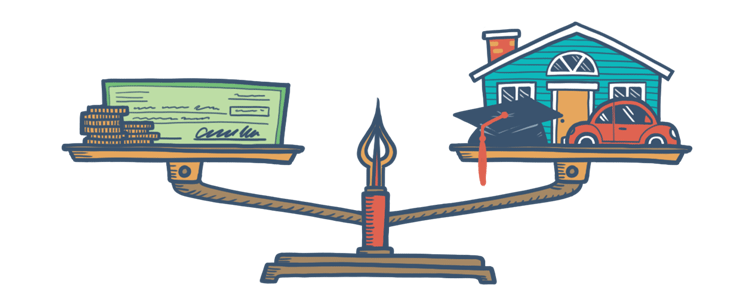Debt-to-Income Ratios

If FHA borrowers start to default on their homes, it defeats the main purpose of the FHA. That's why there are certain criteria in place to ensure that homebuyers are not signing up for home loans that they cannot reasonably afford and pay back. Since the FHA has no minimum income requirement, it relies on the borrowers' debt-to-income ratio to determine whether they have the means to make monthly payments.
What Are Debt Ratios?
Your debt-to-income ratio (also called a debt ratio) gives lenders a clear picture of how much you owe each month to how much you earn. The debt ratio is calculated by dividing the sum of your monthly debts and dividing it by your total assets.
For your monthly debt, the FHA take into account all the money you owe: credit card or lines of credit payments, car payments, student loan payments, taxes, insurance, alimony and child support, as well as the amount of your potential new house payment. Your pre-tax income, wages, tips, child support, social security, amounts to your total monthly assets. The number you arrive at after dividing your total debt by assets is your debt-to-income ratio.
The FHA's Debt Ratio Limits
According to HUD Handbook 4000.1, FHA borrowers can have a “maximum qualifying ratio” 43%. Add up the total mortgage payment for your potential new home (principal and interest, escrow deposits for taxes, hazard insurance, mortgage insurance premium, homeowners' dues, etc.) as well as your recurring monthly debt (car loans, personal loans, student loans, credit cards, etc.). Then divide that amount by your gross monthly income. That number should fall under 43% to qualify.
Many borrowers may have a high enough credit score to qualify for FHA loans and be able to make the down payment as well. But your debt-to-income ratio plays a big role in a lender determining whether you should be granted a loan. A good credit report is important, and it shows lenders that you have a history of making payments on time. But a debt ratio that's too high tells them that you have high monthly expenses compared to how much money you earn and that you might not be the best at budgeting.
The FHA makes some discretionary exceptions for borrowers with debt ratios higher than 43% based on certain “compensating factors.” Borrowers who have higher credit scores, verified cash reserves, or Energy Efficient homes might be granted a loan despite higher debt-to-income ratios.

FHA Loan Articles
March 10, 2021The renewable energy industry is growing more and more every year, and many homeowners have implemented energy-efficient strategies in their homes. This can include programmable thermostats, solar panels, new insulation in the attic, etc.
March 6, 2021When buying a home, you have a list of things you need to do. Get pre-approved, arrange for a home inspection, and a few other tasks. One important thing on that list is shopping for homeowner’s insurance.
February 26, 2021Many Americans go with FHA loans because there are a number of mortgage programs that can fit different needs. These programs include FHA Fixed Rate Loans, FHA Adjustable Rate Mortgages, FHA One-Time Close Loans, FHA Condo Loans, and several others.
February 21, 2021The new year came with some changes being made in the mortgage industry, particularly when it comes to Adjustable- Rate Mortgages, or ARMs. The interest rate you get with an ARM is based on an index and a margin which is disclosed when you apply for the loan.
February 6, 2021As an existing homeowner, you may want to take advantage of falling interest rates by refinancing your current mortgage. For many homeowners, the thought of going through the refinancing process can be tiresome. But an FHA Streamline Refinance could help you avoid the extra work.
January 30, 2021As your closing day gets closer and closer, you might start to feel a little nervous. Do you have everything you need? Will something delay the closing? These worries are natural, but the more prepared you are, the less overwhelming it will all seem.








